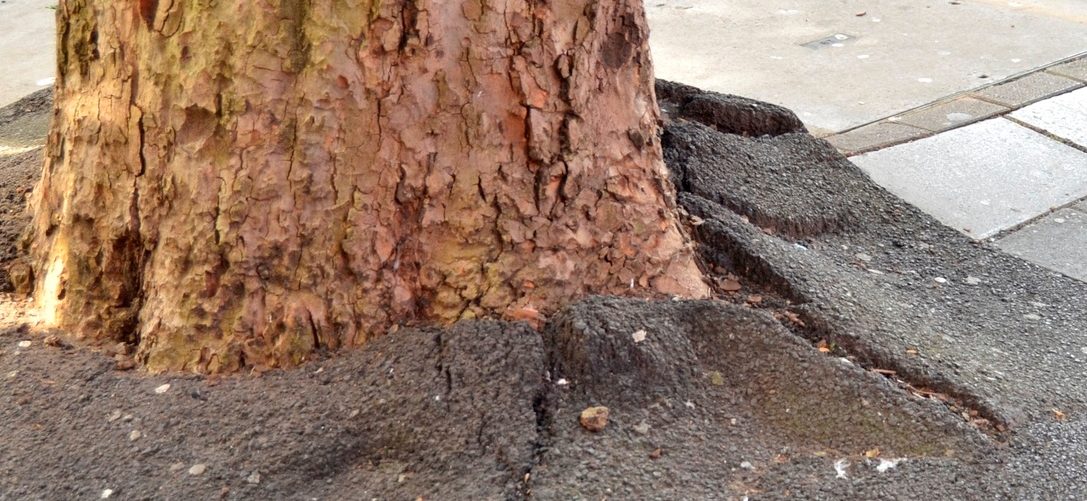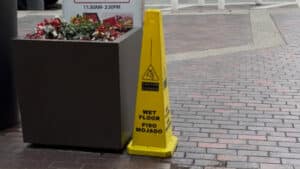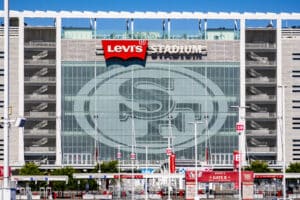
Daryl from San Francisco writes: “Chris, I recently moved to The City. Last week I exited my apartment building from a side door. It was at night and light above the door was out. I didn’t notice that the sidewalk was broken and uneven. I tripped and fractured my wrist. I spoke to the apartment manager. She said to file a claim with The City because roots from a tree cracked the sidewalk. What should I do?”
Daryl, I hope your wrist fully heals. It appears two dangerous property conditions – the exterior light not functioning and the uneven sidewalk – may have caused your fall.
All property owners, whether a landlord, store owner or other business, have a duty maintain the property in a safe condition, or, alternatively, to warn residents, customers or visitors of any dangers. If they fail to do so and a hazard on their property causes an injury, the injured person may bring a premises liability lawsuit to obtain compensation for his or her damages.
In your case Daryl, if the lack of illumination made it particularly difficult to see that the sidewalk was uneven, then the broken light itself could be a dangerous condition. If the light went out that night, it is unlikely that the landlord would be held legally responsible (called “liable”) because there was insufficient time for him or her to learn the bulb needed to be replaced. However, if the landlord knew the light was out and did nothing, the landlord could be held liable.
Even if the landlord did not know that the light was out, he or she could possibly still be held liable. Property owners have a duty to inspect their properties for any hazards. Because of this, you should talk to other apartment residents to find out how long the exterior light had been out.
In regard to the cracked sidewalk, Daryl, the law places responsibility for maintaining the sidewalk outside your apartment building on your landlord. California State and Highways Code Section 5610 states that “owners of lots or portions of lots fronting any portion of a public street . . . shall maintain any sidewalk in such condition that the sidewalk will not endanger persons or property.” Likewise, San Francisco Public Works Code Section 706 mandates that owners must maintain sidewalks surrounding their property in a reasonably safe condition.
Is your apartment manager correct that because a tree caused the sidewalk to break apart any legal claim must be solely brought against The City? The answer is “no.”
San Francisco Public Works Code Section 805 states that it is “the duty of owners of lots or portions of lots immediately abutting on, fronting on or adjacent to any street tree to maintain such tree.” Maintenance is defined as “both routine and major maintenance of the street tree.” Further, this responsibility includes “the care and maintenance of the sidewalk and sidewalk areas adjacent to any street tree.”
Notice in the question I posed in the preceding paragraph I used the word “solely.” The reason why is that despite state law and local ordinances quoted above the City and County of San Francisco remains the owner of public sidewalks and street trees in San Francisco.
California Government Code Section 805 provides that a public agency is liable for an injury caused by a dangerous condition on its property attributable to a negligent act or omission by an employee of the agency. Or the agency can be held liable if it had notice of the hazard and sufficient time to address the hazard but failed to do so.
Consequently, The City is obligated to inspect public sidewalks for hazards and issue notices to property owners to repair dangerous sidewalks. If the property owner fails to repair the sidewalk in a timely manner, San Francisco Public Works Code Section 706.3 states that the Public Works Director shall repair the sidewalk. (The property owner remains obligated to pay for the repair work.)
Daryl, you or an attorney representing you should submit a public records request to The City seeking all records relating to any complaints concerning or inspections of the sidewalk where you fell and whether any notice to repair the sidewalk had been issued to the landlord. If the sidewalk was never inspected or a notice was issued and The City had sufficient time to repair the sidewalk, you may have a sound basis for suing The City.
A further question that needs to be answered is how long the sidewalk posed a danger to pedestrians prior to your fall Daryl. Start by talking to your neighbors. You should also document the condition of the sidewalk. With a ruler, photograph the dimensions of the defect. Your photos should also show the path you took. Many defects are not visible to even the most careful pedestrians.
Finally, please be aware that the law for a slip and fall injuries on sidewalks broken or cracked by street trees in San Francisco will change substantially this Summer. Last November, the voters of San Francisco passed Proposition E. It shifts responsibility for the maintenance of trees along public streets and the surrounding sidewalk from private property owners to the City as of July 1, 2017.
Daryl, do not delay in contacting a trial lawyer to review your case. California law imposes a short deadline, only 6 months from the date of the injury, for bringing a suit against a public agency.
Contact A Slip And Fall Lawyer At The Dolan Law Firm Today
If you have been injured in a serious slip and fall accident, contact our attorneys today by completing our contact form or call us toll free at 1-888-452-4752 for skilled and experienced legal counsel. We will review your case for free, promptly and with no obligation on your part.
We serve clients across the San Francisco Bay Area and California from our offices in San Francisco and Oakland. Our work is no recovery, no free or also referred to as contingency-based. That means we collect no fee unless we obtain money for your damages and injuries.
Please do not delay in contacting us. If your injury occurred on public property (which includes public school, community colleges, municipal parks, etc.), you only have six months from the date of your injury to file a claim under California law.










